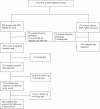Improved quality of life after surgery for pelvic organ prolapse in Nepalese women
- PMID: 23657142
- PMCID: PMC3662601
- DOI: 10.1186/1472-6874-13-22
Improved quality of life after surgery for pelvic organ prolapse in Nepalese women
Abstract
Background: Pelvic organ prolapse (POP) is a common gynecological condition that can affect quality of life (QOL) in women. In Nepal, the prevalence of POP is high, but many affected women are still deprived of treatment. Vaginal hysterectomy with pelvic floor repair is one of the common treatment options for advanced POP. However, QOL outcomes after surgery have not been reported in low-income countries. Thus, we aimed to examine changes in QOL among Nepalese women with POP after such surgery.
Methods: This longitudinal study was conducted in the selected central and peripheral hospitals in Nepal where vaginal hysterectomy was being performed free of cost for POP. A baseline study first measured the QOL domains (physical, psychological, social relationships and environment) among 252 women with advanced POP. Follow-up data was then collected at six weeks and three months after surgery. Among the 177 women that were available at six weeks post-surgery, 166 participated in the follow-up study at three months post-surgery. To evaluate QOL at baseline, 142 women with no history of POP were included as a comparison group.
Results: The mean scores across QOL domains improved from baseline to 3 months after surgery. The baseline score for the physical domain increased from 11.2 to 12.8 at six weeks and 13.5 at three months post-surgery (p < 0.001); the psychological domain score increased from 11.6 to 13.1 at six weeks and 13.8 at three months post-surgery (p < 0.001); the social relationships domain score increased from 13.6 to 14.4 at six weeks and 15.0 at three months post-surgery (p < 0.001); and the environmental domain score increased from 12.9 to 13.9 at six weeks and 14.0 at three months post-surgery (p < 0.001).
Conclusion: QOL progressively improved among women undergoing surgery for POP. Such surgical services need to be scaled up for treatment of advanced POP in low-income countries.
References
-
- Duong TH, Korn A. Predictors of advanced pelvic organ prolapse in Asian women. J Reprod Med. 2009;54(8):488–492. - PubMed
Publication types
MeSH terms
LinkOut - more resources
Full Text Sources
Other Literature Sources
Medical


